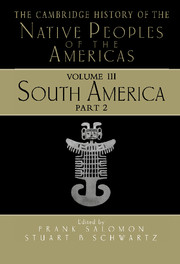Book contents
- Frontmatter
- Contents
- Illustrations
- 14 The Crises and Transformations of Invaded Societies: The La Plata Basin (1535–1650)
- 15 The Colonial Condition in the Quechua-Aymara Heartland (1570–1780)
- 16 Warfare, Reorganization, and Readaptation at the Margins of Spanish Rule: The Southern Margin (1573–1882)
- 17 The Western Margins of Amazonia from the Early Sixteenth to the Early Nineteenth Century
- 18 Warfare, Reorganization, and Readaptation at the Margins of Spanish Rule – The Chaco and Paraguay (1573–1882)
- 19 Destruction, Resistance, and Transformation – Southern, Coastal, and Northern Brazil (1580–1890)
- 20 Native Peoples Confront Colonial Regimes in Northeastern South America (c. 1500–1900)
- 21 New Peoples and New Kinds of People: Adaptation, Readjustment, and Ethnogenesis in South American Indigenous Societies (Colonial Era)
- 22 The “Republic of Indians” in Revolt (c. 1680–1790)
- 23 Andean Highland Peasants and the Trials of Nation Making during the Nineteenth Century
- 24 Indigenous Peoples and the Rise of Independent Nation-States in Lowland South America
- 25 Andean People in the Twentieth Century
- 26 Lowland Peoples of the Twentieth Century
- Index
21 - New Peoples and New Kinds of People: Adaptation, Readjustment, and Ethnogenesis in South American Indigenous Societies (Colonial Era)
Published online by Cambridge University Press: 28 March 2008
- Frontmatter
- Contents
- Illustrations
- 14 The Crises and Transformations of Invaded Societies: The La Plata Basin (1535–1650)
- 15 The Colonial Condition in the Quechua-Aymara Heartland (1570–1780)
- 16 Warfare, Reorganization, and Readaptation at the Margins of Spanish Rule: The Southern Margin (1573–1882)
- 17 The Western Margins of Amazonia from the Early Sixteenth to the Early Nineteenth Century
- 18 Warfare, Reorganization, and Readaptation at the Margins of Spanish Rule – The Chaco and Paraguay (1573–1882)
- 19 Destruction, Resistance, and Transformation – Southern, Coastal, and Northern Brazil (1580–1890)
- 20 Native Peoples Confront Colonial Regimes in Northeastern South America (c. 1500–1900)
- 21 New Peoples and New Kinds of People: Adaptation, Readjustment, and Ethnogenesis in South American Indigenous Societies (Colonial Era)
- 22 The “Republic of Indians” in Revolt (c. 1680–1790)
- 23 Andean Highland Peasants and the Trials of Nation Making during the Nineteenth Century
- 24 Indigenous Peoples and the Rise of Independent Nation-States in Lowland South America
- 25 Andean People in the Twentieth Century
- 26 Lowland Peoples of the Twentieth Century
- Index
Summary
Peoples, tribes, and nations are not eternal entities. Of every named and believed-in society, one can ask not just where it came from but also who believed it to be real: its members, outsiders, or both? When, for how long, and why? In South America as elsewhere, colonial regimes, which so often sought to pigeonhole the groups they overpowered, at the same time unintentionally generated new social groups and sometimes whole new societies. These often escaped the ready categories of both American and European thought except under rubrics of social pathology, and yet many believed them to be real. Sometimes the newly generated categories became important to their members’ sense of self, and, when mobilized, worked fateful changes on their surroundings. This chapter concerns the processes of ethnogenesis – the ways in which new human groupings came to be, and how they were categorized in colonial cultures. It emphasizes the search for factors contributing to their emergence, or non-emergence, as “new peoples” sharing belief in their own uniqueness, solidarity, and legitimacy. Each section focuses on a particular kind of encounter (rather than on a period or area) and highlights the characteristic ethnogenetic processes it generated.
Overall the chapter argues that while colonial society was prolific of new categories of people, not all new categories of people defined themselves as peoples. And for those that did, there were various choices for group definition besides internalizing the stigma of “mixed blood.” Indeed groups that acquired a strong sense of corporate identity tended to define themselves in terms other than “mixture.” In the pages that follow we have outlined the political and demographic reasons for these outcomes as well as for persistent “mixed” labeling where it occurred.
To understand the problem one must first of all accept the sheer unfamiliarity of colonial social categories. Colonial society used the language of “birth” (a semantic field including genealogy, supposedly inherited characteristics like color and moral disposition, and hereditary status) to discuss what would later be called “class” and “race.” The unequal parts of society were often spoken of in terms of “blood“; people of similar “birth” or “blood” were suitable mates to each other. Bad or good sources and matches of “blood” in one’s genealogy determined “purity,” which had become an ideological obsession of Spanish Christians well before 1492.
- Type
- Chapter
- Information
- The Cambridge History of the Native Peoples of the Americas , pp. 443 - 501Publisher: Cambridge University PressPrint publication year: 1999
- 5
- Cited by



